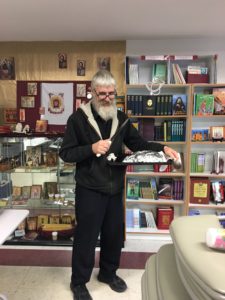
Today, several of us gathered at St. Paul Antiochian Orthodox Church in Brier, WA to have a DoxaDay – a short, half-day Doxacon event that is less structured, more spontaneous, and generally involves beer. We thought we might talk about the horror genre and how we might approach it as Christians.
When we realized that only our regulars were going to show up, we decided to stay and actually engage in this conversation. Two of us, we discovered, don’t even like the horror genre. It’s just not what we choose to watch. I was one of them. I don’t like jump scares, and my memory is so visual that I will close my eyes that night and see the scary thing from a movie (or even a book, if it’s described vividly enough). Being frightened is just not something I want out of entertainment.
However, I do see the value of horror as a means of exploring those things that we don’t like about ourselves or our culture, and that’s what we turned to next.
We talked about zombies as being symbols of a destructive and consuming Otherness, and vampires being the terrible resiliency of psychopaths. You know the ones; you may work with them and sometimes hang out with them, but they’re the ones with no conscience, who keep going no matter what and who don’t care how they achieve their goals. And they feed on vulnerability. The difference, though, is that the zombie is the hive mind, the mindless collective that is bent only on consumption, whereas the vampire is the corruption of an individual soul, whose target is another individual soul, through not just physical but also psychological means. And where do sparkly vampires come in? They seem to be an attempt to normalize this pathological relationship, this corruption of the individual into selfishness and an unending appetite for the life essence of another. And what of the repentant vampires? Louis, Angel, and Spike?
We talked about monster movies and the fear of a terror so large that it can devastate a city. And we talked about serial killer dramas, which seem to be another attempt to normalize something that should never be normalized – the compulsive killing of another human being. Ghosts, too, are a subgenre of horror, about torments so terrible they continue after one dies. Even witches, which, in most folklore, aren’t dead themselves but seem to have some sort of working relationship with death.
We realized, though our dialogue, that the common denominator of all of these subgenres is Death. Whether it is living dead, undead, mass faceless deaths (monsters), calculated death, or horror that outlasts death, Death is the common theme here. And that seems to be the very basis of the horror genre.
When we got to vampires, we had to talk about the Vampire Lestat, from Anne Rice’s Interview with a Vampire, and of course, that led us to Tom Cruise and his seeming entrapment in roles that involve some sort of redemption (so much so that I wish he’d find it already).
But then we got to heroes. Specifically, I mentioned reading a series of novels (The Lunar Chronicles – which are excellent except for a few editorial errors) and wondering why all the heroes and heroines are so young. And, in fact, why it seems that in order to embark on a great adventure like that, the protagonist has to be young. Why is that?
As it turns out, female characters in particular seem to stop their adventuring at around 25. Male characters seem to stop by about 35. And why is this? Why are older characters relegated to supporting roles?
The fairly obvious answer is that for most people, by the time they’re in their 30s, they start having more grounded, basic concerns like paying rent or a mortgage, maybe having a family, making car payments or paying other bills. It is far more difficult to heed the call of adventure when one has to arrange a babysitter or work out vacation time. It can’t be spontaneous anymore. One of us brought up The Incredibles as an example of aging heroes, and I kept thinking about that 80s TV show, Scarecrow and Mrs. King, about a spy who happens upon a divorced woman who lives with her mom and son, and gets her to help him with his covert operations.
And then there are other, more physical concerns – the reduction in stamina and strength, revisiting old injuries. “The adventure begins – opening the pickle jar!” What does an adventure look like for a hero who is aging? Does it even have the same physicality that a younger person’s adventure would? And if not, how does the drama play out?
We didn’t come up with a lot of answers, but there was a lot of food for thought. We spent several hours eating, talking, drinking, and laughing, sharing in each others’ company and getting a few really good ideas.
And this is what you’re missing when you can’t make it to DoxaDay: stimulating conversation, great company, and a lot of laughter. I hope you join us, either for one of these short events, or for our regular Doxacon Seattle (the next one will be February 10, 2018 – buy tickets now!).
